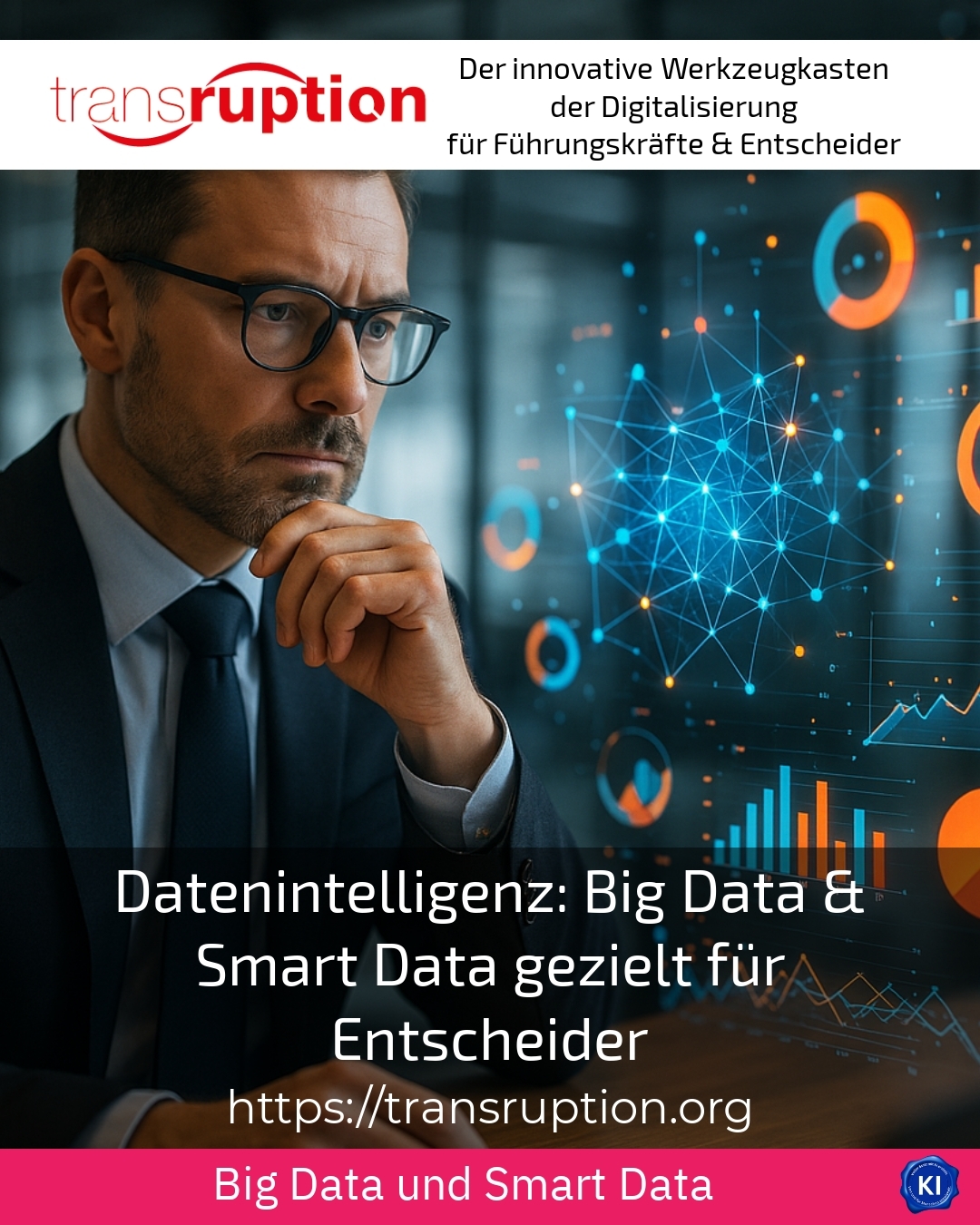Data intelligence as the key to well-founded decisions
In today's business world, data intelligence is essential to derive real added value from the mass of information available. While many companies have enormous amounts of data at their disposal, decision-makers are often overwhelmed by the quantity and complexity of the raw data. The trick is to filter big data in a targeted manner and generate smart data from it. This is the only way to gain reliable insights that really support strategic business decisions.
Data intelligence opens up a wide range of opportunities to promote efficiency, flexibility and innovation by providing practical insights. This makes it possible to steer investments in a targeted manner and build competitive advantages.
From data overload to clarity: the difference between big data and smart data
Big data describes large, heterogeneous and often unstructured amounts of data that originate from numerous sources such as IoT sensors, transactions or user interactions. This raw information is initially difficult to keep track of and offers little value without being analysed.
Smart data, on the other hand, stands for the high-quality, filtered and contextualised information that is extracted from big data. It is precise, relevant and enables fast and reliable decisions. Algorithms and AI-supported processes play a central role here in order to process data more intelligently and tailor it precisely to the issues facing companies.
For example, a manufacturer uses sensor data from its systems to optimise maintenance intervals and reduce unplanned downtime by means of data-intelligent analysis. In the financial sector, smart data can help to recognise attempted fraud at an early stage. And in retail, it promotes personalised marketing campaigns that target customers and strengthen loyalty[3][4][5].
Practical examples of data-intelligent applications
1 A logistics company analysed its supply chains with the help of data-intelligent systems. This enabled bottlenecks to be recognised early and delivery times to be predicted more accurately. This led to considerable cost savings and more satisfied customers[4].
2 A marketing agency used smart data to record customer behaviour in real time. This allowed them to flexibly adapt campaigns and significantly reduce wastage, which sustainably increased sales[4].
3) In production, real-time monitoring of machines using data intelligence made it possible to ensure product quality and significantly reduce downtimes. Maintenance was planned in a targeted manner, which saved resources[11].
Data intelligence for decision-makers: How smart data creates added value
It is a challenge for managers to quickly gain important insights from complex data worlds. Data intelligence supports them in this process by providing strategically prepared information that can be used quickly.
This makes it easier to assess project risks and recognise opportunities at an early stage. In areas such as supply chain management, marketing or financial planning in particular, the targeted use of smart data ensures better control and greater agility.
Clients often report that data-intelligent approaches lead to more informed and faster strategic decisions. Modern technologies such as machine learning help to identify patterns and analyse relevant data in real time[2][6][7].
Specific tips for implementation
- Start with a clear definition of the business questions to be answered with data intelligence.
- Rely on intelligent data integration that brings together and cleanses different sources.
- Use algorithms specifically to filter smart data from the flood of data and avoid over-information.
- Pay attention to data protection and data quality to ensure trust and compliance.
- Promote a corporate culture that supports data-based decisions and enables continuous learning.
My analysis
Today, data intelligence is an indispensable resource for companies that want to hold their own in dynamic markets. While big data provides the raw mass of information, it is the smart, contextualised data that generates real insights. For decision-makers, this means using less data but more targeted information to optimise strategic decisions and operational processes. The implementation of data-intelligent solutions opens up numerous opportunities, from increasing efficiency and minimising risk to better customer targeting.
The combination of technology, a methodical approach and a data-oriented culture helps companies to fully utilise the added value of their data. Accordingly, data intelligence not only accompanies analytical processes, but also all entrepreneurial activities on the path to sustainable success.
Further links from the text above:
What is smart data - B2B smart data
Big data vs. smart data: is more always better? - Netconomy
Data intelligence: With big & smart data to better ... - Sauldie
Unleashing data intelligence: Big Data & Smart Data for ... - Sauldie
Smart Data: Definition, application and difference to Big ... - O2 Business
Smart data, or the intelligent use of data - Appvizer
Data intelligence: clever use of big data and smart data - Sauldie
For more information and if you have any questions, please contact Contact us or read more blog posts on the topic TRANSRUPTION here.















